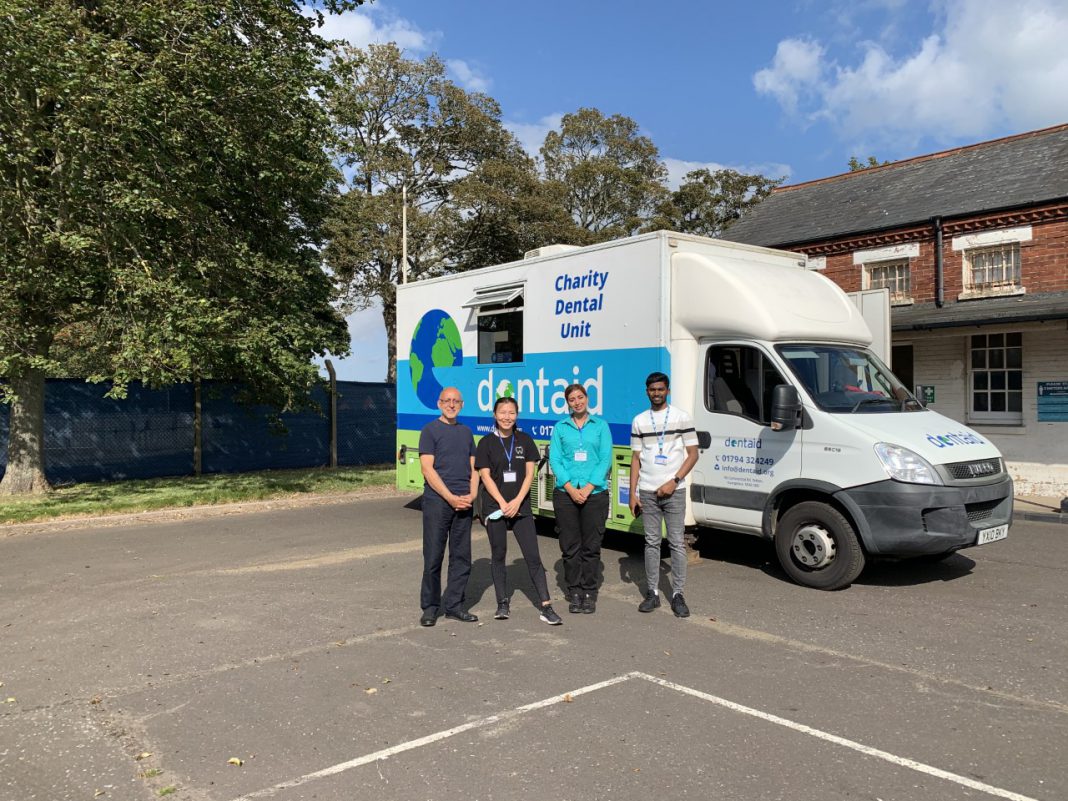I have kept the readers of Rye News informed of my dental volunteering role since my first trip to Thessaloniki, northern Greece in 2016. Then I was working with refugees in somewhat makeshift camps, I am still working with refugees in camps but much closer to home – Napier Barracks in Folkestone to be precise.
There are many similarities between my overseas experience and my local experience. I arrive at a camp, the perimeter is fenced off, barbed wire is in evidence. I have to be checked and double-checked by security guards, proving who I am and what I am there for. Once allowed in I make my way to the dental unit. I have worked in shipping containers, tents, a disused toilet paper factory, a derelict mental asylum, basements, offices, the living room of a flat and now I am in a converted van – the Dentaid mobile dental unit. The charity has two of these, one based in the north of England, one in the south, which I use, and which has come from Southampton.
The working day starts with a briefing session to discuss the workload of the day, potential problems and equipment malfunctions. Sadly, the latter are all too common and l have found myself constrained in the treatment I can offer because of this. There are language barriers, most of the refugees I have seen do not speak English, and there is a lack of interpreters so the initial taking of a detailed medical and dental history can be problematic. Some of the staff at the barracks can speak Arabic, which is helpful, but we have to use a mobile app or telephone translator for Kurdish, Farsi, and Tigrean (the language of Eritrea). The information gathered is logged. The nurse and I can review it in advance of seeing each patient. Working with a good nurse makes the job more pleasant and more straightforward but recruiting dental nurse volunteers has not proved to be easy, more are needed.
The number of refugees housed in Napier Barracks remains at 200 – 250, all of whom are single males aged approximately 20-45 years old. This is despite the numbers of refugees crossing the Channel. Napier Barracks offers only temporary accommodation, refugees are sent on to places like Liverpool, Manchester and Reading after Folkestone. Those who live in Napier Barracks are healthy young men; I was distressed, therefore, to learn that the commonest medical problems encountered by the staff are suicide, attempted suicide, and self-harm. I sense a general malaise and pessimism when I visit. Do the refugees lack that glowing beacon within, the hope that has sustained them thus far? I don’t see games of football being played, for example. There may be valid reasons for this but it may point to a general apathy pervading those who live at the Barracks.
The range of treatment that can be offered from the mobile unit is limited. This can lead to frustration. For my own part, I know that I could do more if I had the equipment but some patients come with unrealistic expectations and so emotions can run high at times. However, the vast majority of our encounters are good and positive which is why I carry on with the role, it is fulfilling and rewarding to be able to help and be of service.
At my last visit, we had finished our list of patients for the day. As often happens as we are packing up a last patient appears. In this instance, a desperate-looking young man peered into our surgery saying that he hadn’t eaten or slept for many days because of unbearable pain. It’s always the decision of the dentist on duty whether to see the patient in such circumstances or whether to tell him to come back when the unit next visits Folkestone. My policy is not to turn anyone away who is in pain so I examined him and attempted to take a radiograph (x-ray) but, for various reasons, this was difficult. I suggested that an extraction was the best option but the patient flatly refused this advice in the most emphatic terms; therefore, the best I could do was to offer pharmaceutical help to tide him over telling him that this would not provide a long-term solution. He went away, taking the prescription with him, and we continued to pack up. Some minutes later the patient reappeared having decided that he would, after all, accept an extraction. This was carried out, much to his relief (and ours), but was not achieved without much cajoling and reassurance. The patient was so delighted at the end that he insisted on having a photograph taken with me – the universal language of the “thumbs up” signalling his satisfaction!
I also work with Dentaid treating rough sleepers and the vulnerably housed in Eastbourne. Though superficially similar I find that it’s a different experience. There is no language barrier, of course. Aside from that, I somehow find the Eastbourne cohort of patients less emotionally draining to treat despite their extremely unfortunate life experiences. Each venue and set of patients has its own rewards and challenges; overall I feel privileged to have the opportunity to volunteer my services.
Image Credits: courtesy of Dentaid .




Thank you for this beautiful report, Kyriacos, of the wonderful work you continue to do. My heart goes out to these people who can’t see a bright future in their bleak situation, and whose hope fades. It would be great to have periodic follow up reports….
What an amazing thing you do for these unfortunate people!